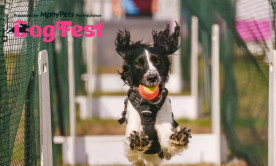In early January 2023 BBC News reported on a guide dog shortage for the visually impaired. The article highlighted that The Guide Dogs for the Blind Association (also known simply as Guide Dogs) reported that the average wait time for a guide dog increased from 12 months to 18.
This increase in wait times was caused by the Covid pandemic which put a pause on breeding, training and socialising for five months. Socialising is an important part of guide dog training as developing the dog’s senses in their early development greatly affects their perception and behaviour around people.
Socialising guide dogs starts in basic training and puppies can start between 12 and 15 months old. Basic training usually lasts nineteen weeks before Advanced Training begins, which places dogs in real world environments. However, the number of puppies making it through the training process has recently dropped from 65% to less than 50%, which the Guide Dog Association have said is the lowest in decades.
We have more information on the training process and their duties in our article Dogs With Jobs: Guide Dogs.
Visually impaired people training their own guide dogs
This decline in available guide dogs has led to visually impaired people training their own. PAWtected CIC is an organisation originally setup in 2017 and provides accessible dog education to help disabled people train their own assistance dog. With the increased wait time for accredited guide dogs trained by the Guide Dog Association, PAWtected are helping people in need directly plug the availability gap.
Self trained dogs that are not accredited by a big organisation are still allowed by law to go where officially trained guide dogs can go to assist their owners, like shops and restaurants. It takes roughly 12 months for a new partnership to become fully established between the dog and its owner but taking undertrained guide dogs out in the real world before their completely trained does come with complications.
Talking to the BBC one owner of a self trained assistant dog talked about how it caused trouble in her office by pulling down cubical dividers and biting through phone cables.
Tim Stafford, director of Canine Affairs at the Guide Dogs Association, believes guide dogs should be independently assessed rather than owner-trained to "provide clarity, reassure the public and service providers."
Volunteering to training guide dogs
The Guide Dogs Association are actively looking for people to foster guide dogs. Fosterers provide a temporary home for dogs while they train to become fully accredited guide dogs. A role of a volunteer fosterer includes:
- Taking the dog to their training sessions
- Provide a loving home for the dog and help them with their training ‘homework’
- Feed and groom the dog
- Ensure the dog is not alone for more than 4 hours a day
- The Guide Dog Association also pays all veterinary costs, food costs, and other materials needed for training
If you would like to volunteer your time and provide a home for a guide dog, you can search for fostering opportunities in your local area on the official Guide Dogs Association website here:
Main Header Image by prostooleh on Freepik





